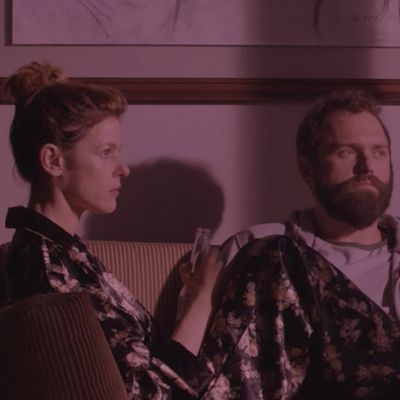
ÔÇ£This film was written in 2017 and shot in 2019. Any resemblance to actual events is purely coincidental.ÔÇØ Those words appear at the start of Iuli GerbaseÔÇÖs The Pink Cloud, and for a while, itÔÇÖs hard to tell if theyÔÇÖre a disclaimer or a flex. The Brazilian directorÔÇÖs sci-fi-inflected drama follows two people who wind up stuck in an apartment together after mysterious and deadly pink clouds force humanity indoors. But the fictional life these fictional people experience in this fictional story about a fictional apocalypse bears an uncanny resemblance to our own, current, very real situation.
And when I say uncanny, I mean uncanny. Though she made her film before the COVID-19 pandemic paralyzed the planet, Gerbase has imagined a cloistered, technologically mediated, increasingly agitated reality that feels unnervingly accurate in both its particulars and its generalities ÔÇö whether itÔÇÖs video calls with parents who are growing older and frailer, or the way social attitudes change in the face of a rolling crisis.
The dynamics of the cloud itself are largely irrelevant; all one has to know is that it kills you in ten seconds flat and it canÔÇÖt seep in through the small gaps in closed doors, so your home is safe. Soon after the clouds settle in, the government arranges for a system of remote food delivery, and life becomes an endless sequence of smothering sameness. Characters try to shift to doing everything remotely, even jobs that require physical contact. They watch viral videos of jagoffs fighting each other in supermarkets. Metaphor or not, I could feel a panic attack coming on at multiple points.
Even the philosophical cadences of the story feel creepily familiar. For Giovana (Renata de L├®lis) and Yago (Eduardo Mendon├ºa), two 30-somethings who wake up from a one-night stand to find that circumstance has forced them together, the clouds at first seem like a mere nuisance: They assume, like everyone else, that things will soon clear up, and they waste time goofing around and having sex. As the days and weeks and months (and, eventually, years) wear on, however, the two find themselves contemplating what a life together will actually look like. The random, unforeseen presence of the cloud has not simply disrupted life ÔÇö it has reshaped it, changed how we relate not just to our environment but to each other and (perhaps more importantly) to whoever might come into the world next.
Yago wants children, Giovana doesnÔÇÖt. After they inevitably do have a baby ÔÇö with a midwife offering Giovana birthing directions via a laptop screen ÔÇö their child grows up not knowing anything about the life that once was. Which prompts the question: What is reality: the world Giovana and Yago once knew, or the one that now exists? Who is in denial: the person who accepts things as they currently are, or the one who yearns for what once was? At what point did I stop using the expression ÔÇ£the Before TimesÔÇØ as a joke and start using it as a basic descriptor?
The film is shot, at least initially, with the simplicity of a parable. The deadpan playfulness of the performances speaks not to the urgency of Giovana and YagoÔÇÖs situation but to the symbolic nature of the cloud. In interviews, Gerbase suggests that her picture is partly about the expectations society places on people, particularly women.┬áÔÇ£My idea was having these two characters that reacted differently to the Cloud, because we know from the beginning that Yago wants one thing and Giovana wants another. And the Cloud is pressuring her little by little to do things that she doesnÔÇÖt want to do,ÔÇØ the director recently explained in a revealing Film Freak Central interview.
But when a metaphor becomes reality, meaning takes on a life of its own. The Pink Cloud might have started life as a symbolic fable, but we as viewers today know a lot more about the world it presents than the filmmakers ever could have. (One could say something similar has happened with Adam McKayÔÇÖs DonÔÇÖt Look Up: An audience all-too-conversant with our apathy in the face of disaster is sure to have a lot of highly specific thoughts on the accuracy of a satire about our apathy in the face of disaster.)
And there is, perhaps, a problem with being too prescient, too prophetic. When you capture something so accurately ÔÇö be it intentional or not ÔÇö you leave little room for the imagination to take over. The Pink Cloud is so good at portraying our pandemic reality that it becomes harder to discern its other, subtler concerns. I was impressed, agitated, terrified, depressed by this movie ÔÇö but I also couldnÔÇÖt help feeling like I had maybe not ultimately seen the film its director wanted me to see.
The Pink Cloud premiered at last yearÔÇÖs Sundance Film Festival, and its eerie clairvoyance was noted then. (It opened in New York last week, opens in Los Angeles this week, and will be available on demand in March.) Over the past year, itÔÇÖs perhaps become even more prophetic. At one point, the clouds seem like they might be parting and going away. Some begin to anticipate finally getting to do all the things that they havenÔÇÖt been able to do for years. Others begin to dread the disruption, the return to life as it once was ÔÇö the return, in some cases, to a world they never really knew. I wonÔÇÖt tell you what happens next. But then again, I donÔÇÖt have to. YouÔÇÖve lived it.
More Movie Reviews
- Flow Is an Animal Adventure ThatÔÇÖs Endearing and a Little Too Pretty
- Alien: Romulus Gets the Job Done, But at What Cost?
- Blitz Is the Worst Movie Steve McQueen Has Made


